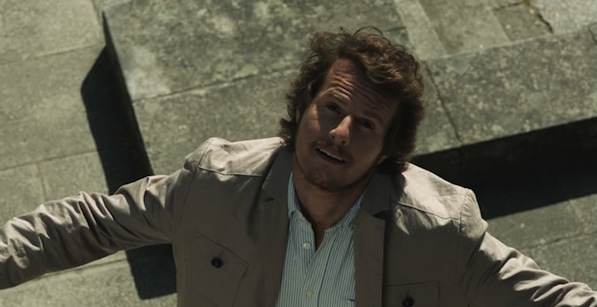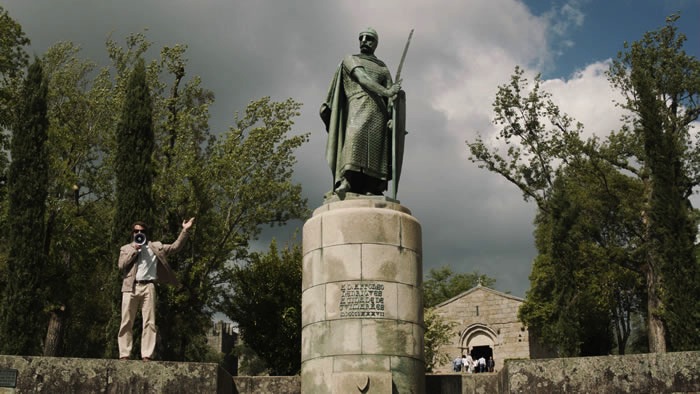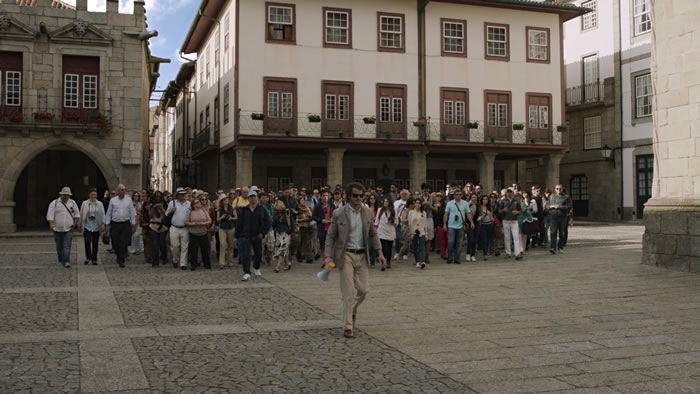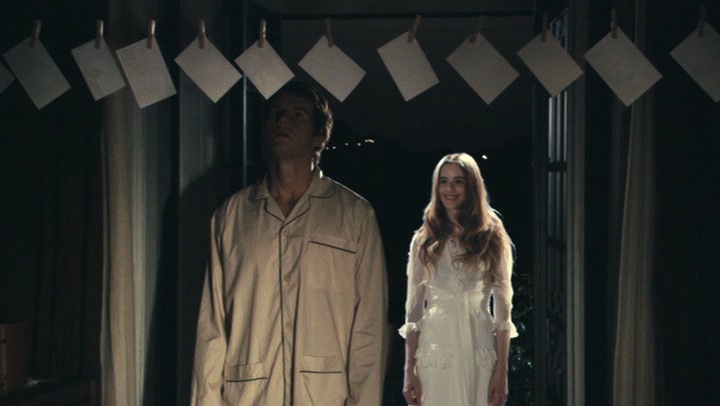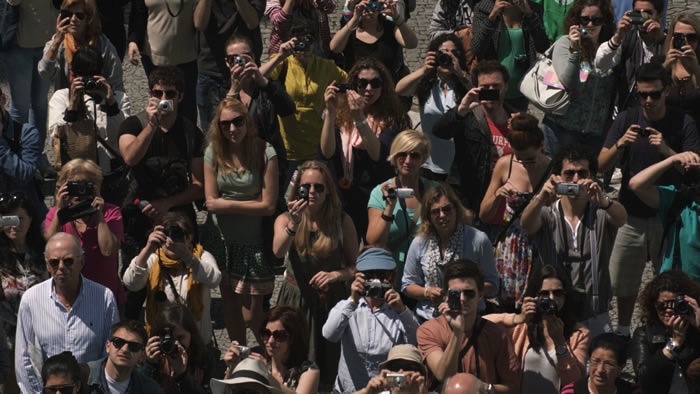Manoel de Oliveira’s short film The Conquered Conqueror closes the new omnibus feature Centro Histórico [Historic Center] (2012), which began a weeklong theatrical July 19 at the New York theater Anthology Film Archives. The short begins with a pan over a castle’s walls while a male voice narrates Portuguese history in English through a loudspeaker. The bus is passing through the city of Guimarães, where Portugal’s first king, Afonso I, was born in 1109; it stops outside the king’s castle in order to unload camera-snapping tourists. As actors ride out on horses in the spirit of historical reenactment, the visitors glance up at a proud statue of King Afonso I himself. The tour guide, too, meets the ruler’s gaze, and helplessly shrugs.
The sardonic The Conquered Conqueror follows three other shorts about the preservation of human history in Guimarães, with all four shorts commissioned as part of a yearlong celebration of Guimarães as the European Cultural Capital. Aki Kaurismäki’s The Tavern Man shows an aging waiter (played by Kaurismäki regular Ilkka Koiluva) prepares the menu at an old bar; Pedro Costa’s Sweet Exorcist presents a graying Cape Verdean immigrant (played by Ventura, who starred in Costa’s tremendous Colossal Youth [2006]) reliving traumatic memories of war and imprisonment; Erice’s Broken Windows consists of documentary interviews with former textile factory employees, all of whom tell their life stories in front of a large still photograph of their younger selves at work. Ever since Centro Histórico’s world premiere at last year’s Rome Film Festival, many critics have dismissed Oliveira’s ten-minute closer as an irrelevant trifle in comparison to the shorts preceding it. But although The Conquered Conqueror functions as a grace note, it also comments on the preservation of human memory in a moving, self-sufficient way indicative of its filmmaker.
Oliveira—the world’s oldest active filmmaker at age 104—has been exploring how people try to preserve their own histories since early on in his filmmaking career. The four films for which he first gained international acclaim (collectively known as “The Tetralogy of Frustrated Love,” and made between 1971 and 1981) all deal with people attempting to reach seemingly unattainable love objects. As they struggle to do so, they compose their feelings by organizing them into written texts, transforming transient problems into lasting stories. Oliveira has often returned to this structure, including Eccentricities of a Blonde-Haired Girl (2009), in which a young man revisits an old romantic obsession by recounting his tale to a stranger on a train.
The young man is played by Ricardo Trêpa, the director’s grandson and an ubiquitous Oliveira actor, who has previously played Oliveira stand-ins the lovely city symphony Oporto of My Childhood (2001) and the romantic ghost story The Strange Case of Angelica (2010). In the second film (discussed at greater length on Keyframe in a recent Jordan Cronk essay), Trêpa plays a photographer whose artistry works to preserve the memory of the living and the dead alike. The actor also does this as the tour guide in The Conquered Conqueror, though the different context makes his efforts more comic than romantic. In Angelica, Trêpa’s character makes his beloved’s image immortal in order to preserve it for himself, while in The Conqueror Conquered he places feeling on top of a standardized historical narrative in order to sell it better.
In Leon Cakoff’s film Manoel de Oliveira Absoluto (2010)—a long recorded interview with the filmmaker included as an extra on The Cinema Guild’s exquisite home video release of Angelica—Oliveira claims that the filmmakers he values make distinctions between public and private life. No matter how much the films show, their characters maintain mysteries and secrets to be hidden from view. Oliveira gives the example of Carl Theodor Dreyer’s great Gertrud (1964), a theatrically presentational film whose title character’s absolute love stays private by film’s end, its essence left unrevealed.
Oliveira’s own cinema has valued the distinction between public and private histories, with love often being what differentiates the two. No matter how human emotions are publicly presented, the actual feelings stay hidden within people, to be lost when they are. In A Talking Picture (2003), a history professor (played by Oliveira regular Leonor Silveira) and her young daughter travel on a cruise between Bombay and Portugal, with the mother narrating ancient history to her inquisitive daughter at sightseeing stops in between. As the two women hold hands in front of Egyptian pyramids and the Acropolis, the film gives the sense that human relationships are more precious than any icon or work of architecture are, since life tends to last much briefer than art does. Oliveira’s most recent feature, Gebo and the Shadow (2012), works to highlight the fragility of human life in the face of art even further. The film essentially announces that it is an adaptation of a 19th-century play (written by Raul Brandão) by presenting long, essentially static interior scenes of people sitting and talking. The actors are old, recognizable Western European film veterans, among them Claudia Cardinale, Jeanne Moreau, Michel Lonsdale, and Oliveira regular Luis Miguel Cintra. As the characters’ discussions turn towards fear of death, the film reminds viewers that these people will soon be gone.
All people will eventually lose their bodies; what will be left of them in the physical world, at most, will be images. Yet Oliveira’s films argue that those images can still preserve the mysteries of the once-live people they present. In this sense, The Conquered Conqueror is an appropriate close to Centro Histórico, whose segments all look at public history as a record of formerly private lives. When Trêpa’s tour guide shrugs at the statue of King Afonso I, it’s as though he is acknowledging a historical icon to have been a relatable human being.

